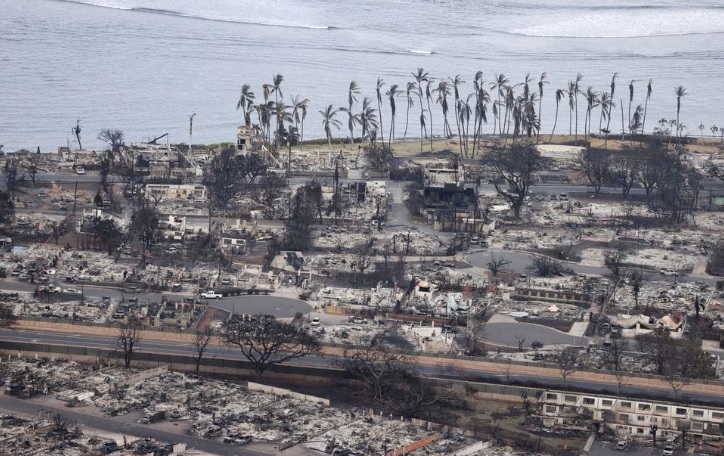Maui's wildfires have killed at least 55 people, a toll expected to rise, and unleashed destruction on the resort town of Lahaina that will take many years and billions of dollars to rebuild, Hawaiian officials said on Thursday.
Governor Josh Green said the inferno that reduced much of Lahaina to smoldering ruins was the worst natural disaster in the state's history, making thousands of people homeless and leveling as many as 1,000 buildings.
"It's going to take many years to rebuild Lahaina," Green said told a news conference, as officials began to map out a plan to shelter the newly homeless in hotels and tourist rental properties.
"It will be a new Lahaina that Maui builds in its own image with its own values," Green said of the city that draws 2 million tourists each year, or about 80% of the island's visitors.
The fast-moving inferno, which started on Tuesday, spread from the brush outside of town and ravaged the historic city of Lahaina that was once the capital of the Hawaiian Kingdom.
It was one of three major wildfires on Maui, all of them still burning, that were fueled by dry conditions, a buildup of fuel and 60 mph (100 kph) gusts of wind.
Even as firefighters continue to put out smaller fires and search and rescue teams almost certainly have yet to recover all the dead, federal recovery dollars have started to flow along with an influx of supplies and equipment.
Among the incoming assistance were cadaver dogs from California and Washington that would aid search and rescue teams combing through the ruins, officials said.
"Understand this: Lahaina town is hallowed, sacred ground right now," Maui Police Chief John Pelletier said, referring to remains that have yet to be recovered. "We have to get them out."
Thousands of tourists and locals were evacuated from the western side of Maui, which has a year-round population of about 166,000, with some taking shelter on the island or on the neighboring island of Oahu. Tourists camped in the Kahului Airport, waiting for flights back home.
Green said the scope of the disaster would surpass that of 1960, one year after Hawaii became a U.S. state, when a tsunami killed 61 people on the Big Island of Hawaii.
Some people fled the flames by jumping into the Pacific Ocean.
Among them was Vixay Phonxaylinkham, a tourist from Fresno, California, who said he was trapped in a rental car with his wife and children as the fires approached, forcing the family to abandon the car and take refuge in the water.
"We floated around four hours," Phonxaylinkham said from the airport while awaiting a flight off the island, describing how they held onto pieces of wood for floatation.
"It was a vacation that turned into a nightmare. I heard explosions everywhere, I heard screaming, and some people didn’t make it. I feel so sad," he said.
Many more people suffered burns, smoke inhalation and other injuries.
"It was so hot all around me, I felt like my shirt was about to catch on fire," said Nicoangelo Knickerbocker, a 21-year-old resident of Lahaina, said from one of the four emergency shelters opened on the island.
Knickerbocker heard cars and a gas station explode, and soon after fled the town with his father, bringing with them only the clothes they were wearing and the family dog.
"It sounded like a war was going on," he said.
The fate of some of Lahaina's cultural treasures remains unclear. The historic 60-foot(18-meter)-tall banyan tree marking the spot where Hawaiian King Kamehameha III's 19th-century palace stood was still standing, though some of its boughs appeared charred, according to a Reuters witness.

Maui County said in a statement that the Lahaina fire was 80% contained, as firefighters secured the perimeter of the wild land areas that burned.
The Pulehu fire, about 20 miles (30 km) east of Lahaina, was 70% contained. There was no estimate for the Upcountry fire in the center of the eastern mass of the island, Maui County said.

Scenes of fiery devastation have become all too familiar elsewhere in the world this summer. Wildfires, often caused by record-setting heat, forced the evacuation of tens of thousands of people in Greece, Spain, Portugal and other parts of Europe. In western Canada, a series of unusually severe fires sent clouds of smoke over vast swaths of the U.S., polluting the air.
Human-caused climate change, driven by fossil fuel use, is increasing the frequency and intensity of such extreme weather events, scientists say, having long warned that countries must slash emissions to prevent climate catastrophe.
Source: Reuters






